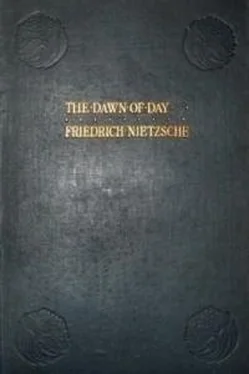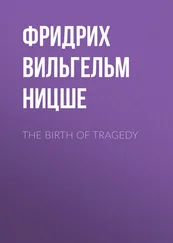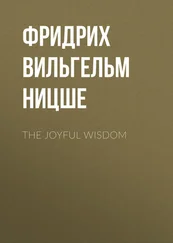452.
IMPATIENCE.—There is a certain degree of impatience in men of thought and action, which in cases of failure at once drives them to the opposite camp, induces them to take a great interest in it, and to give themselves up to new undertakings—until here again the slowness of their success drives them away. Thus they rove about, like so many reckless adventurers, through the practices of many kingdoms and natures; and in the end, as the result of their wide knowledge of men and things, acquired by their unheard of travel and practice, and with a certain moderation of their craving, they become powerful practical men. Hence a defect in character may become the school of genius.
453.
A MORAL INTERREGNUM.—Who is now in a position to describe that which will one day supplant moral feelings and judgments!—however certain we may be that these are founded on error, and that the building erected upon such foundations cannot be repaired: their obligation must gradually diminish from day to day, in so far as the obligation of reason does not diminish! To carry out the task of re–establishing the laws of life and action is still beyond the power of our sciences of physiology and medicine, society and solitude: though it is only from them that we can borrow the foundation–stones of new ideals (but not the ideals themselves). Thus we live a preliminary or after existence, according to our tastes and talents, and the best we can do in this interregnum is to be as much as possible our own “ reges ,” and to establish small experimental states. We are experiments: if we want to be so!
454.
A DIGRESSION.—A book like this is not intended to be read through at once, or to be read aloud. It is intended more particularly for reference, especially on our walks and travels: we must take it up and put it down again after a short reading, and, more especially, we ought not to be amongst our usual surroundings.
455.
THE PRIMARY NATURE.—As we are now brought up, we begin by acquiring a secondary nature, and we possess it when the world calls us mature, of age, efficient. A few have sufficient of the serpent about them to cast this skin some day, when their primary nature has come to maturity under it. But in the majority of people the germ of it withers away.
456.
A VIRTUE IN PROCESS OF BECOMING.—Such assertions and promises as those of the ancient philosophers on the unity of virtue and felicity, or that of Christianity, “Seek ye first the Kingdom of God and His righteousness, and all these things shall be added unto you,” have never been made with absolute sincerity, but always without a bad conscience nevertheless. People were in the habit of boldly laying down principles—which they wished to be true—exactly as if they were truth itself, in spite of all appearances to the contrary, and in doing this they felt neither religious nor moral compunction; for it was in honorem maiorem of virtue or of God that one had gone beyond truth, without, however, any selfish intention!
Many good people still act up to this degree of truthfulness: when they feel unselfish they think it permissible to treat truth more lightly. Let it be remembered that the word honesty is neither to be found among the Socratic nor the Christian virtues: it is one of our most recent virtues, not yet quite mature, frequently misconstrued and misunderstood, scarcely conscious of itself—something in embryo, which we may either promote or check according to our inclination.
457.
FINAL TACITURNITY.—There are some men who fare like the digger after hidden treasures: they quite accidentally discover the carefully–preserved secrets of another’s soul, and as a result come into the possession of knowledge which it is often a heavy burden to bear. In certain circumstances we may know the living and the dead, and sound their inmost thoughts to such an extent that it becomes painful to us to speak to others about them: at every word we utter we are afraid of being indiscreet.—I can easily imagine a sudden silence on the part of the wisest historian.
458.
THE GREAT PRIZE.—There is a very rare thing, but a very delightful one, viz. the man with a nobly–formed intellect who possesses at the same time the character and inclinations, and even meets with the experiences, suited to such an intellect.
459.
THE MAGNANIMITY OF THE THINKER.—Both Rousseau and Schopenhauer were proud enough to inscribe upon their lives the motto, Vitam impendere vero . And how they both must have suffered in their pride because they could not succeed in verum impendere vitæ! — verum , such as each of them understood it,—when their lives ran side by side with their knowledge like an uncouth bass which is not in tune with the melody.
Knowledge, however, would be in a bad way if it were measured out to every thinker only in proportion as it can be adapted to his own person. And thinkers would be in a bad way if their vanity were so great that they could only endure such an adaptation, for the noblest virtue of a great thinker is his magnanimity, which urges him on in his search for knowledge to sacrifice himself and his life unshrinkingly, often shamefacedly, and often with sublime scorn, and smiling.
460.
UTILISING OUR HOURS OF DANGER.—Those men and conditions whose every movement may mean danger to our possessions, honour, and life or death, and to those most dear to us, we shall naturally learn to know thoroughly. Tiberius, for instance, must have meditated much more deeply on the character and methods of government of the Emperor Augustus, and must have known far more about them than even the wisest historian.
At the present day we all live, relatively speaking, in a security which is much too great to make us true psychologists: some survey their fellow–men as a hobby, others out of ennui, and others again merely from habit; but never to the extent they would do if they were told “Discern or perish!” As long as truths do not cut us to the quick we assume an attitude of contempt towards them: they still appear to us too much like the “winged dreams,” as if we could or could not have them at our discretion, as if we could likewise be aroused from these truths as from a dream!
461.
HIC RHODUS, HIC SALTA. —Our music, which can and must change into everything, because like the demon of the sea, it has no character of its own: this music in former times devoted its attention to the Christian savant, and transposed his ideals into sounds: why cannot it likewise find those brighter, more cheerful, and universal sounds which correspond to the ideal thinker?—a music which could rock itself at ease in the vast floating vaults of the soul? So far our music has been so great and so good; nothing seemed impossible to its powers. May it therefore prove possible to create these three sensations at one time: sublimity, deep and warm light, and rapture of the greatest possible consistency!
462.
SLOW CURES.—Chronic illnesses of the soul, like those of the body, are very rarely due to one gross offence against physical and mental reason, but as a general rule they arise from innumerable and petty negligences of a minor order.—A man, for example, whose breathing becomes a trifle weaker every day, and whose lungs, by inhaling too little air, are deprived of their proper amount of exercise, will end by being struck down by some chronic disease of the lungs. The only remedy for cases like these is a countless number of minor exercises of a contrary tendency—making it a rule, for example, to take a long and deep breath every quarter of an hour, lying flat on the ground if possible. For this purpose a clock which strikes the quarters should be chosen as a lifelong companion.
All these remedies are slow and trifling; but yet the man who wishes to cure his soul will carefully consider a change, even in his least important habits. Many a man will utter a cold and angry word to his surroundings ten times a day without thinking about it, and he will forget that after a few years it will have become a regular habit with him to put his surroundings out of temper ten times a day. But he can also acquire the habit of doing good to them ten times.
Читать дальше











